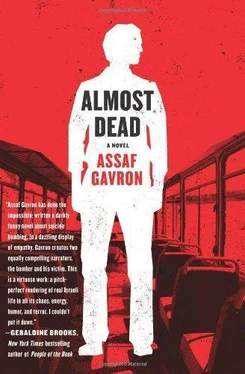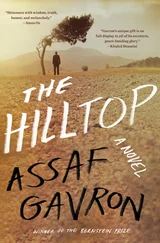‘ Mama, I told you, I can’t talk at work! I’m not shouting. I am not shouting. OK. OK, I’ll come with you tomorrow morning. How dare…listen, someone’s coming now, I can’t talk… ’
A crescent moon spilled a little silver over the yellow-lit camp, over the one-storey shacks, the jungle of antennae on the tin roofs, the narrow dirt alleys and the few asphalt roads, the scattering of battered old cars and tired tractors and the dome of the mosque. From time to time we passed people on their way home. Children were playing football in the yellow street light and I watched Bilahl, who was once a pretty good footballer, follow them instinctively with his gaze.
Mahmuzi had grown up in Al-Amari. After high school he’d worked in Israel in agriculture and construction, until all his routes upwards were blocked. He came back and started studying at the Hebron Polytechnic but quit. In the past four years he had become completely dedicated to his prayer. He’d talked to Islamic Jihad members in Ramallah, but was told they weren’t recruiting. He had just happened to talk to Naji that morning.
One sister. A traditional family, but the parents separated when he was seven or eight. They were angry kids, used to throw blocks at the mosque windows. He was still living with his mother, and still angry. His father had remarried and lived in Nablus. His sister was studying law in Amman.
‘What depresses you?’ I asked.
‘I’m not depressed by anything,’ he said.
‘Did you bid farewell to your loved ones?’
‘I didn’t bid farewell to anyone.’
I explained about the belt, as I had with Naji. He had good hands and a cool head. Afterwards Bilahl talked to him quietly and at length. As we were leaving, Mahmuzi knelt down in the corner on the prayer mat Bilahl had given him and bowed his back. When he straightened up his eyes were closed and a rapid, low mumble was issuing from his mouth along with clouds of his breath, visible in the cold air.
Bilahl told him not to leave the apartment and not to speak to anyone.
‘ Tell me what am I going to do with this mother? She’s driving me nuts! ’
At last! Oh, Svet. I need your fingers…
‘ What are you thinking about? You’re sweating again. There’s a storm outside and here you are sweating. This’ll make you feel better. Yes? ’
Yes…
There are eleven gates to heaven and rivers of many colours flow through it — white rivers of milk, golden rivers of honey, and crimson rivers of wines which never intoxicate. There are orchards of date palms and apple trees whose trunks and branches are made of gold. Jojoba and frankincense grow freely, and vines and flowers. Breath in heaven smells of ambergris. Light never fails. And there will be seventy-two beautiful virgins, dressed in white…
All of us die and it doesn’t really matter how many years you’ve lived before death comes, ten or a hundred: you’ll either be with God or you won’t.
Bilahl didn’t tell Mahmuzi but when we returned from the operations apartment to our own, I asked him where the next attack was going to be.
Jerusalem.
After four days of rain and fog it dawned so crisp and clear you could feel the air tickling the back of your larynx when you breathed it in. The sky was a very pale blue — as cold and clear as the eye of a Siamese cat.
Shuli lived in the German Colony, in a flat in one of the tall buildings at the end of Hazfira Street, where the tennis courts are. A nice neighbourhood: trees and little parks, the buildings clad in creepers, birds buzzing about. When I dropped her off that night I asked her whether she fancied a game, and she’d laughed and said, ‘One day.’
‘How about tomorrow morning? Are you working tomorrow?’
‘I’ve got a night shift,’ she said, touching my unshaven cheek with her palm and opening her door. It was her father’s flat: Davidi Vaknin had been delighted to have Shuli back home after her divorce. Not only to help her through it but also because his daughter and her ex-husband had drifted away from religion in their four years of marriage and he nursed hopes of coaxing her back to God. And also because he was lonely. Shuli’s mother had succumbed to a long disease a few months after the wedding, her sister was off backpacking round India.
‘Night shift — which means I’m not working in the morning.’
So that morning I parked the Polo near her house and we walked along Hazfira Street towards Emek Refaim Street. I held her hand for a while, but she didn’t seem comfortable with it. Her hands were cold, she claimed. She needed to put her gloves on.
‘Don’t worry,’ she reassured me. ‘You’ll see. Tonight.’
‘I’m not worried,’ I said, and she lowered her eyes and smiled a smile that was half embarrassment and half a promise. I did know that she had just lost her boyfriend, that everything had just been thrown upside down, and everything like that, but it seemed to me somehow that she was the sort of person who would always be like this: heightened, impulsive, very alive. A wave of warmth broke from my heart and flooded upwards to my throat, and for a few seconds I actually seemed to be unable to breathe. I could feel my heart beating faster, desperately trying to get some oxygen into my blood.
We went to the post office. In order to get her chef’s certificate she needed a year’s experience in a recognised restaurant, references from qualified chefs (Alon had been happy to oblige) and to pass exams in theory and practice at the Tadmor Hotel in Herzliya. She sent off the forms she had to send off. In a bakery she bought a loaf of bread for her dad; in a stationer’s she bought a notebook for herself. She had decided to write to Giora every day. I asked whether she was planning on telling him everything.
‘I never hid a thing from him in the four months we were together.’
‘And what about him?’
‘Well, who knows? Every night when we went to bed we’d tell each other everything that had happened to us that day. I’d say, “Tell me something else”, and I’d keep saying, “Something else” until he’d told me the lot. And then I’d tell him everything back.’ She fell silent for a moment. ‘Did you hear from the guy who met Giora in Tel Aviv?’
‘Binyamin? The guy from the PalmPilot? We said we were going to go and find him in Tel Aviv.’
‘Yeah, we said that, didn’t we? But maybe tomorrow?’
I wasn’t in any hurry. Tonight I was going to see. ‘OK,’ I said.
‘Now I need an Ice Europa,’ she decided. There wasn’t any debate. She said it, we did it.
The place was pretty full. The security guard searched us with his metal wand on the off-chance we were packing any landmines, his big steel lollipop emitting its somehow disappointed little cheeps. Shuli ordered a croissant and an Ice Europa. I went for an egg sandwich and a cappuccino. I overruled her attempts to pay (‘I owe you,’ she said) and steered us towards a round table for two not far from the entrance and sat down facing the street. She sat opposite and stared at me until I said, ‘What?’
‘Why did you choose this table?’
‘I don’t know. It was free.’
She looked around and her gaze took in the other free tables.
‘You want to move?’
‘No. It’s just that this is our old table. How did you choose this table out of all of them? And you talked to him a minute before he died. It’s like…’ She blinked back the tears that were never far from her surface. ‘Don’t listen to me, I’m talking crap,’ she said. ‘It’s funny, I always sat facing the street, and he always sat opposite me. So now I can see what he used to see. All the people here.’
Читать дальше












